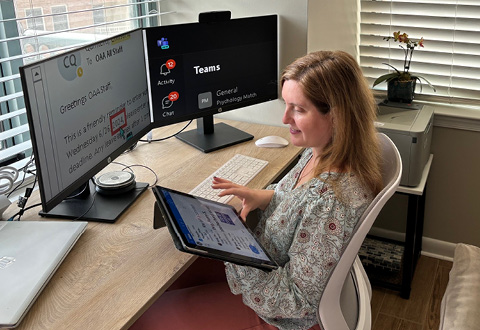Attention A T users. To access the menus on this page please perform the following steps.
1. Please switch auto forms mode to off.
2. Hit enter to expand a main menu option (Health, Benefits, etc).
3. To enter and activate the submenu links, hit the down arrow.
You will now be able to tab or arrow up or down through the submenu options to access/activate the submenu links.
Locator
Contact
Search
Empowering trainees with disabilities

Stacy Pommer, the national affiliations officer for the Office of Academic Affiliations, uses an iPad with accessibility settings to enhance text while working. Pommer is currently working on a special project to improve reasonable accommodation processes at VA facilities for health professions trainees.
By Cheryl Whitney, Public Affairs Officer for the VHA Office of Academic Affiliations
Wednesday, July 3, 2024
When Stacy Pommer was 8 years old, she started to get blurry vision. By middle school she couldn’t see the chalkboard and began struggling through school. Though she had many doctor’s visits and eventually a misdiagnosis of Attention Deficit Disorder, Pommer didn’t know the cause of her problems.
It wasn’t until her mid-twenties, once genetic testing became available, that she was diagnosed with Stargardt disease, a rare genetic eye disease that leads to central vision loss.
As Pommer’s vision initially decreased and she was declared legally blind at age 22, she became overwhelmed at the thought of losing her vision. “It was really difficult when it was diagnosed because it was my senior year of college,” said Pommer. “I had not shared it with many people and I didn’t know how to understand this. It was very depressing.”
For Pommer, the biggest issue was the loss of independence in her life. “It was really tough because I was finishing school and starting my career. And I had to stop driving.”
Pommer didn’t quite know what to do with her career, though she was interested in health care. She began as a meeting planner for medical conferences and one day met a VA ophthalmologist at a national conference.
“He really took me under his wing and shared all about blind rehabilitation service in VA and that I should really look into that as a career option,” said Pommer.
Pommer realized social work would be her path to become a Visual Impairment Services Team (VIST) Coordinator. As a social work intern, Pommer started with VA during her second-year field placement at the New York Harbor VA and co-facilitated a support group for low-vision Veterans with the VIST Coordinator.
Now the national affiliations officer for the Office of Academic Affiliations (OAA), Pommer says her career has come full circle from where it began.
“It’s been an awesome experience working for OAA because we actually fund blind rehabilitation training programs, and I will tell you, blind rehab in VA is state-of-the-art,” said Pommer. “I had the opportunity to go to one of the blind rehab centers for a week and I learned more there for myself, even, than I’ve learned elsewhere.”
As Pommer navigated her way through VA employment with a disability, her biggest challenges were technology and the changes in technology, especially after COVID. “A lot of the personal connections I had to assist me with navigating the technology as we all moved to the various virtual platforms were gone. I had to learn how to use these new platforms and it became more challenging,” said Pommer.
Pommer also had to ensure she informed peers and supervisors of her disability so that when updates were made, she had time to adjust. “I’ve had to be very intentional about who I educate about my disability. My disability is not visible to other people, so communication is important,” said Pommer.
Another big part of her journey has been advocating for herself and what she needs to do her job, or reasonable accommodations. For Pommer, these can include an Eschenbach device—an illuminated, handheld magnifier; iPhone and iPad accessibility settings to enhance text; ZoomText for PC/laptop—a fully integrated magnification and reading program tailored for low-vision users; MaxTV glasses and monocular devices to provide magnification for conference room settings.
These challenges led Pommer to her current journey to improve reasonable accommodation processes at VA facilities for health professions trainees who may experience challenges advocating for themselves.
“I’m involved in a special project with health professions trainees to really understand what their needs are for reasonable accommodations so we can clarify, standardize, and document that process,” said Pommer. “The deputy undersecretary’s office has been working on a lot of work streams with supporting disabilities and assisting with that. We are in the discovery phase and it’s great that there are resources going into that space.”
One of the most important improvements Pommer believes VA can do is education for employees and providers. “A lot of times there is ableism and unconscious bias, so the more we can normalize disability and show that people can be successful across all health professions whether they are providers or trainees, I think is going to go a long way,” said Pommer. “Having VA be a champion for that is important and that’s where we can strive to be—and we are getting there.”
The mission of training future health professionals for VA and the nation, established more than 78 years ago, is one of VA’s four statutory missions and is overseen by the Office of Academic Affiliations. More than 120,000 health professions trainees in over 60 clinical disciplines train at VA each year as they care for Veterans.






























